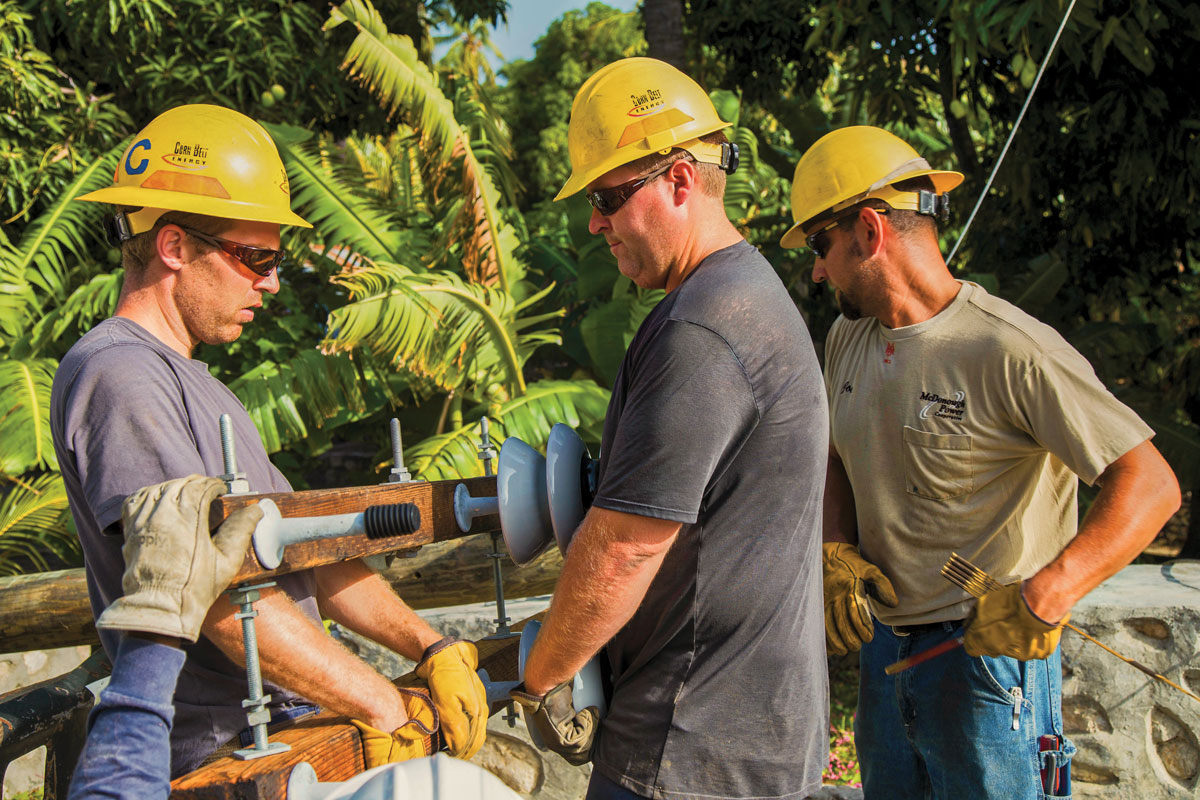The excitement was thick as they gathered in the dark in anticipation of what was to come. An ever-strengthening roar went through the crowd as hands were thrown in the air in triumphant jubilation. The switch had been pulled, and suddenly light broke the darkness! After years of living in darkness, new possibilities were on the horizon.
Research by the World Bank shows that access to electricity is a very powerful economic development tool—a human development necessity. Electricity is enabling people to break free from subsistence living that hasn’t progressed much beyond the wood fire. Electricity simply opens up a world of possibilities.
The mission is a huge undertaking because 1.6 billion people across the globe, especially in rural areas, still lack basic electric service. They’re trapped in poverty and rely on kerosene or wood to power their lives.
In some of the poorest areas of the world, like Bangladesh, Bolivia, Costa Rica, Dominican Republic, Guatemala, Liberia, Philippines, Sierra Leone, South Sudan, Tanzania, Uganda and Haiti, the answer has been a helping hand from electric cooperatives here in Illinois and across the United States. Electric cooperative volunteers are planting utility poles and seeds of hope.
History of helping
For more than 54 years, U.S. electric cooperatives have shared their expertise with world communities that have needed it most. In 1962, President John F. Kennedy signed an agreement of cooperation between the National Rural Electric Cooperative Association (NRECA) and the U.S. Agency for International Development (USAID), to create NRECA International. Since then, the 250 rural electrification programs that NRECA International has established in Latin America, Africa and Asia have provided access to safe, reliable and affordable electricity to more than 110 million people in more than 43 developing countries. These efforts continue to be made possible with generous funding and support from electric cooperatives, USAID and multilateral development banks.
With continued support from co-op leaders, volunteers and staff, NRECA International has constructed and upgraded power lines. But this program is a self-help cooperative program and the main focus is training local cooperative utility staff to help build institutional capacity and ensure these electric cooperatives experience long-term success.
Currently, NRECA International is helping more than 42,000 people in Haiti, 7,000 in Tanzania, 4 million in the Philippines and more than 500,000 in Uganda. Behind these numbers are families and communities who are beginning a better life. Streets are made safer by streetlights; studying and reading isn’t limited by daylight; doctors can utilize more equipment and access more medicine thanks to refrigeration; and irrigation techniques have improved with the help of powered water pumps. With electricity and a budding entrepreneurial spirit local businesses sprout and grow.
Helping hand to Haiti
Haiti ranked No. 20 on the United Nations’ 2014 list of least-developed countries, a list it’s been on since 1971. So anything that improves the quality of life is welcome—especially bringing electricity to those without. Along with the poverty comes compounding problems of unrest and a young democracy, as shown by recent election problems and leadership changes in Haiti.
In May 2015, three linemen from Corn Belt Energy Corporation, Bloomington, and McDonough Power Cooperative, Macomb, volunteered their time to work hard for families living in three small towns in Haiti, about 1,800 miles away from their own families.

Adam Brendsel and Todd Moore from Corn Belt Energy, and Joseph Wernsman from McDonough Power Cooperative spent three weeks in the communities of Coteaux, Port-A-Piment, and Roche-A-Bateau, located about 150 miles from the capital Port-au-Prince. They worked alongside two local linemen to build and upgrade power lines for the newly established electric cooperative in the region, the Cooperative Electrique de l’Arrondisement des Coteaux (CEAC).
“When we started the co-op down here, we couldn’t find a single lineman that could climb in this area,” recalls Dana Brosig, NRECA International project manager. “We have now trained four local linemen to climb and work alongside our volunteers. We have also brought two linemen from a cooperative in Bolivia to work alongside and train the teams. It can be a challenge with people speaking English, Creole, and Spanish, but they do a lot of charades and have translators when that doesn’t work.”
Today, thanks in part to these linemen and other cooperative linemen, the construction is complete. A solar-diesel hybrid power generation system can now serve more than 1,600 member-consumers in the area.
“Port-au-Prince was a huge shock, to see how a third world country really is,” says Joe Wernsman. “I’d classify it as a fourth or fifth world country. But once you get outside of that, the people were just extremely nice and the town we stayed in was really a nice, clean little town.”
The biggest challenge was the language barrier. Wenrsman says, “We had two engineers from Bolivia and they spoke broken English. Our translator after that, he spoke English, but he learned all of his words from American rappers. So it was a little interesting trying to communicate.”
Wernsman says there were some poles already set, but what was there was more for political show than a commitment to really provide electricity. “What we heard happened was a new governor was up for election. Well, he built this system real quick with no intent of getting it energized. It was just to appease the people. So we were working off that system and it was sketchy at best. Some of the poles we could reuse, but many of them we had to change out. A couple of the poles were only in the ground maybe a foot.”
Adam Brendsel says often their work would draw curious crowds of children. “We get wrapped up in things here in the United States. You go there and you see people that don’t have anything, but they have a smile on their faces. Seeing the kids there, it all just made a real impression on me. They are happy to see you and always hanging on you.”
So why go on a mission like this? If you talk to just about any lineman who has gone on this type of “mission trip” they’ll tell you how much they appreciate what we have here, and they want to go back to help again.
Brendsel shared his experience with his children. “I tried to explain to my kids how privileged we are to be able to just flip a switch and have electricity. I told them I wanted to go, and it was God’s plan for us to go and serve others. They were very thankful for our help.”
Over the past 12 months, 40 volunteers from 21 NRECA member cooperatives have volunteered to get CEAC up and running with 33 miles of new or upgraded power lines. And at ceremonies on September 10, 18, and October 18, residents of these three towns cheered as streetlights glowed for the first time.
This is not the first time volunteers from Illinois electric co-ops have traveled far to help. In 2014, Jim Miles from the Association of Illinois Electric Cooperatives (AIEC), along with Allen Plott and Steven Hoffman from Southern Illinois Electric Cooperative, made the journey to Guatemala to train students from local utilities on safe work practices. Often co-op linemen bring safety equipment and tools with them to donate. Local linemen often don’t even have hard hats.
Illinois cooperatives sign up for Bolivia project
Recently, the AIEC’s NRECA representative Phil Carson proposed a group project for the state’s electric cooperatives. By cooperatively pooling resources and donations, the co-ops will take on a project in Bolivia. With donations from 19 electric co-ops, three vendors and eight individuals, more than $69,000 was raised to cover transportation and other costs.
Carson, a minister in southern Illinois, believes in the mission of the NRECA International Program and the power of cooperation. He serves on the board of directors for Tri-County Electric Cooperative, Egyptian Telephone Cooperative and as Vice President of NRECA’s board of directors.
Carson says, “Helping the unfortunate is always the right thing to do. Speaking as a Christian, our Lord tells us to ‘love your neighbor as you love yourself.’ In the end every human on the face of this earth is our neighbor, and doing this type of work is an act of love, and thus the right thing to do.”
The act of giving changes the giver. Carson says every volunteer remarks that it is a life changing experience. “It has an impact on our linemen. They return as changed, re-charged and re-energized employees. I had a chance to visit Guatemala in 2014, to see the lights turned on in a village there. We were treated as heroes. I would love to see Illinois cooperatives do this for other villages.”
NRECA International has had a long and successful history in Bolivia, that dates back to 1962 when it helped to establish Bolivia’s Rural Electrification Cooperative (known as “CRE” in Spanish). But the job isn’t finished and through the years, NRECA International has continued to partner with Bolivia and CRE to develop dozens of rural electrification projects.
Though large and successful, CRE’s reach is limited by geography. In Bolivia’s largest state of Santa Cruz, for instance, nearly a third of the terrain lacks the infrastructure needed to provide electric coverage. Santa Cruz is roughly the size of Montana and has a population of approximately 2.8 million people. In real terms, that means some 840,000 people do not have access to electricity. Currently, the local government of Santa Cruz is responsible for extending electricity to these communities, but is unable to meet these needs. Illinois cooperatives will be helping with two priority areas: El Fuerte and Cuevas.
Matt Eisenmenger, Safety Instructor for the AIEC and a former lineman for Eastern Illini Electric Cooperative, will be leaving this month on a scouting trip to Bolivia. “We’re going to go over the logistics, see what the terrain is like, and see what material we’ll have to work with,” says Eisenmenger.
Over the years this has been something he has wanted to do. “I’ve talked to the guys that have been down to Haiti and Guatamala, and they all come back saying they are so thankful for what we have here,” he says. “We forget how important electricity is until there is a long outage. These people are always in the dark.”
Eisenmenger says this fits the cooperative principle of concern for community. “Cooperatives are giving; we do things for our members and communities and give back. This is the world community. This is how REA was started, with that first light bulb, and there are so many places in this world that still don’t have that. It is kind of amazing when you stop and think where we are with technology, and there are still people out there who don’t even have a light bulb. That is mind blowing to me.”
How to help
To learn how NRECA International improves the quality of life for people around the world, visit nrecainternational.coop, send an email to international.foundation@nreca.coop or call (703) 907-5645. Honor your friends and family with NRECA International Foundation tribute cards and help a great cause. With your donation, NRECA International staff will mail tribute cards on your behalf to whomever you wish to honor.
All proceeds will help implement critically needed electrification projects throughout the developing world. Over the past 50 years, NRECA International has provided 110 million people in developing countries with access to safe, reliable and affordable electricity. In 42 countries, life has improved through better education, healthcare, more jobs, and safer streets at night.








